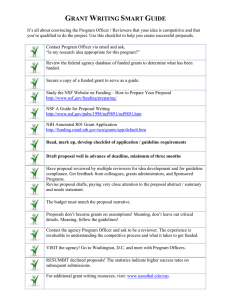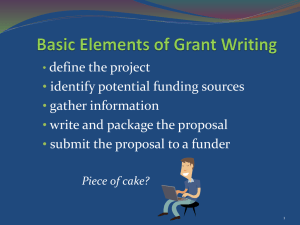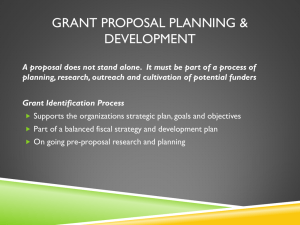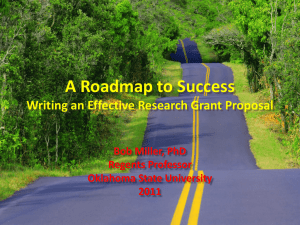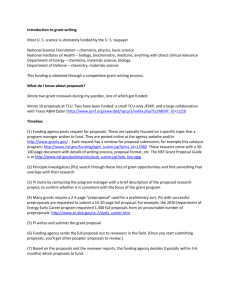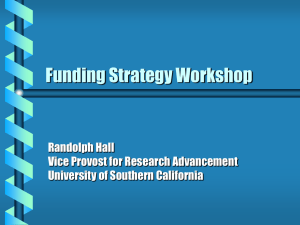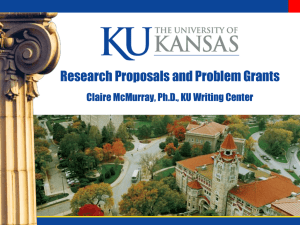NSF Proposal Preparation & Merit Review Criteria
advertisement
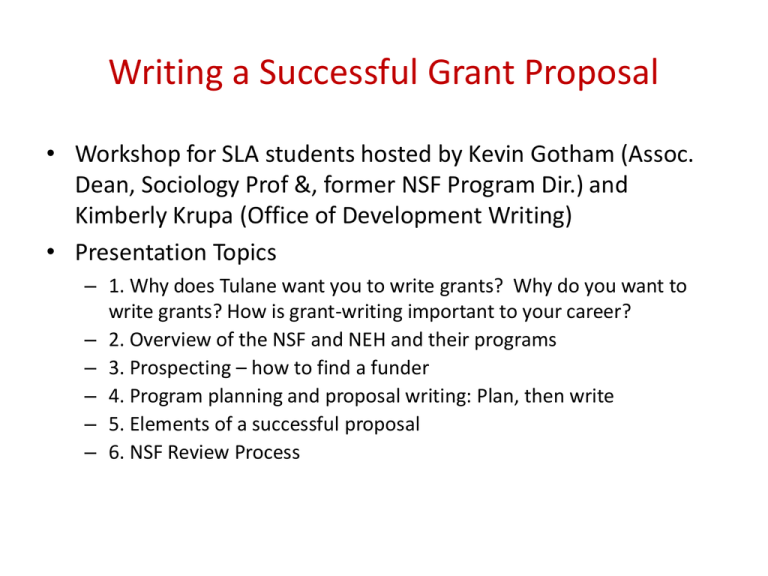
Writing a Successful Grant Proposal • Workshop for SLA students hosted by Kevin Gotham (Assoc. Dean, Sociology Prof &, former NSF Program Dir.) and Kimberly Krupa (Office of Development Writing) • Presentation Topics – 1. Why does Tulane want you to write grants? Why do you want to write grants? How is grant-writing important to your career? – 2. Overview of the NSF and NEH and their programs – 3. Prospecting – how to find a funder – 4. Program planning and proposal writing: Plan, then write – 5. Elements of a successful proposal – 6. NSF Review Process Why does Tulane want you to write grants? • High visibility for the university • Contributes to prestige and national ranking of the university’s student body Why do you want to write grants and pursue external funding? • Summer salary, travel • Raises your research visibility • Opens doors to consulting, collaborative research, new research agendas, etc. • Increases opportunities for writing, national & international presentations, & shaping public policy • Career development National Science Foundation • Supports education and training at all levels • Promotes public understanding of science, engineering and math • Offers a variety of funding opportunities for graduate students and scholars • Who receives awards? – Universities and colleges – Academic consortia – Nonprofit institutions – Small businesses – University and industry collaborations – National research centers – International research and education efforts NSF-5 Social, Behavioral & Economic Sciences Programs Inter-Disciplinary Disciplinary •Cultural Anthropology •Physical Anthropology • Archaeology • Linguistics • Social Psychology • Economics • Sociology • Political Science • • • • • • • • • • • • Cognitive Neuroscience Developmental & Learning Sciences Documenting Endangered Languages Perception, Action & Cognition HOMINID Geography & Spatial Sciences Decision, Risk & Management Sciences Science of Science & Innovation Policy Innovation & Organizational Sciences Methodology, Measurement & Statistics Science, Technology, & Society Law & Social Sciences NSF Doctoral Dissertation Improvement Awards • • • • • Dissertation advisor is the grant PI Begin seeking IRB (human subjects) approval immediately Expect decision process to take approximately six months Work with your university’s Sponsored Research Office Small grants provide support for costs related to dissertation: • field work, data collection, payment to subjects, survey expenses, software, microfilm, reproduction of tapes and written materials, data transcribing. • Travel to specialized facilities and field research sites. • Partial living expenses for conducting research away from the student’s university National Endowment for the Humanities (NEH) • • • • • • • • Challenge Grants Education Programs Public Programs We the People Office of Digital Humanities Preservation and Access Research Programs Federal/State Partnership Prospecting • $426 billion is awarded each year for research – 14 percent federal – 11 percent corporations and foundations – 75 percent private donors • Overview of private funders • Overview of government funders Proposal Writing • Plan, then write • Research: Problem or need? Solutions? Funders? • Planning and management: Best approach? How should I do it? How? • Relationships: Work along or collaborate? Roles? • Finances: Cost? Matching or leveraged resources? Sustaining the research beyond the grant? • Writing: Presenting the case in a clear, compelling manner Elements of Successful Proposals • Introduction to the research – First thing reader sees but usually written last – Brief overview of proposal – Who benefits and how many – Individual qualifications and credibility Elements of Successful Proposals • Discussion of problem or need: The motivation for developing the research – What is the situation that is cause for concern? – Why is it happening? How is the situation expected to change? What activities will produce the change? Note: A problem is a current condition, not the lack of a specific method Elements of Successful Proposals • Outcome objectives (goals, outcomes, results, impact, accomplishment): How is the situation expected to change as a result of the grant? • Increase/decrease in behavior, situation or condition • Who or what? – Is going to change in what way? • By how much? – During what period of time? Elements of Successful Proposals • Methods (approach, activities, program plan, work plan, project design, strategy): What activities will be used to achieve the intended results? Why was this approach chosen? • Include overview, target population, full description of activities, timeline/work plan, collaboration, staffing, facilities or equipment Elements of Successful Proposals • Evaluation plan (program assessment, measures of success) How will achievement of intended results be measured? • Criteria to measure results • Baseline information as starting point • How/who/what information collected and anayled • How will results be used? Elements of Successful Proposals • Budget: what will the effort cost? Are others contributing and how much? • Direct: personnel and non-personnel (office space, equipment, supplies, travel) • Indirect: administrative, overhead, usually % of direct, cost of maintaining facilities • Other resources: grants, cash, fees • In-kind match: donated resources, attach cash value (volunteers, use of equipment) Elements of Successful Proposals Narrative and packaging No jargon Clearly written Simple sentences Logic + Emotion = Power Speak Clearly • Use lay language • Instead of this: Speak Clearly The meeting of often conservative religious, ethnic and class values regarding gender roles and sexuality with diasporic migrations through this fluid maritime space, determined by labor consignments, social violence, natural disasters and/or desires of freedom or economic opportunity created a unique and vibrant cultural cauldron. Speak Clearly • Say this: • As people migrated to new areas in the wake of natural disasters or in search of employment, vastly different cultures began to interact. Be Honest • You will most likely have to report back to the funder • Tell your story, but don’t exaggerate Most common mistakes • • • • • • • Budget does not match proposal narrative Terms not defined Technical language Funder’s questions are not answered Does not match funder’s priorities No sustainability plan No Evaluation plan How to Develop a Proposal • Determine your long-term research and education goals – What do you intend to do and why is your research important? – What work has already been done and how are you going to do your research (data collection and analysis)? • Develop your bright idea – Survey the literature – Contact Investigators working on topic – Obtain preliminary data – Prepare a brief concept paper – Discuss with colleagues/mentors • Prepare to do the project – Determine available resources – Realistically assess needs – Develop preliminary data – Present to colleagues/mentors/students How to Develop a Proposal • Determine possible funding sources • Understand the ground rules – Read carefully announcements and instructions – Determine whether your project fits program scope – Look over prior award abstracts – Ascertain evaluation procedures and criteria – Talk with NSF Program Officer • Coordinate with your institution and sponsored research office • Ask PIs for copies of proposals “Few things are harder to put up with than the annoyance of a good example.” Mark Twain Budget Tips • Amounts – Reasonable for work -- Realistic – Well Justified -- Need established – In-line with program guidelines • Eligible costs – Personnel – Equipment – Travel – Other Direct Costs, Subawards – Facilities & Administrative Costs NSF Merit Review Criteria 1. • • • • • What is the intellectual merit of the proposed activity? How important is the proposed activity to advancing knowledge and understanding within its own field or across different fields? How well qualified is the investigator (individual or team) to conduct the project? (If appropriate, the reviewer will comment on the quality of prior work) To what extent does the proposed activity suggest and explore creative and original concepts? How well conceived and organized is the proposed activity? Is there sufficient access to resources? NSF Merit Review Criteria 2. • • • • • What are the broader impacts of the proposed activity? How well does the activity advance discovery and understanding while promoting teaching, training and learning? How well does the activity broaden the participation of underrepresented groups (e.g., gender, ethnicity, disability, geographic, etc.)? To what extent will it enhance the infrastructure for research and education, such as facilities, instrumentation, networks and partnerships? Will the results be disseminated broadly to enhance scientific and technological understanding? What may be the benefits of the proposed activity to society? Common shortcomings of proposals that are not funded • Nothing new – it has already been done (absence of innovative idea or hypothesis) • Incremental contribution – no evidence of a breakthrough (not exciting or cutting edge) • Disconnected – proposed research does not follow from the idea • Trust me – lacks sufficient detail about proposed approach • Not feasible – proposed methods not likely to work • Overly ambitious – impractically large project • Unstated assumptions – proposed research presupposes the answer • Unreasonable budget – budget items don’t follow from the research plan Start Early and Don’t Be Shy • Write, rewrite, and rewrite again • Get critiques from mentors, previous members of review panels, and program directors • Be aware of the scope: “too ambitious” versus “too narrow.” • Make it easy for reviewers: simplify and streamline (make sure to get the overall idea across); pay attention to details; keep in mind that the reviewer may not be an expert in your specific field • Convince the reviewers that your proposal is the one to support Conclusions • • • • The NSF, NEH, and other federal funders are looking to fund research that is bold, original, innovative, and transformative Pay attention to the funding agency’s goals and review criteria as you craft your proposal Get as many people you trust to read your proposal – you’d be surprised what you miss! Revise your proposal and submit again Resources • • • • The Grantsmanship Center http://www.tgci.com Chronicle of Philanthropy http://philanthropy.com/ Foundation Center http://foundationcenter.org/ Tulane Sponsored Projects Administration http://tulane.edu/asvpr/ora/funding-opportunities.cfm • Foundation Directory Online access: – NOPL, Technology Division, 504.596.2580
